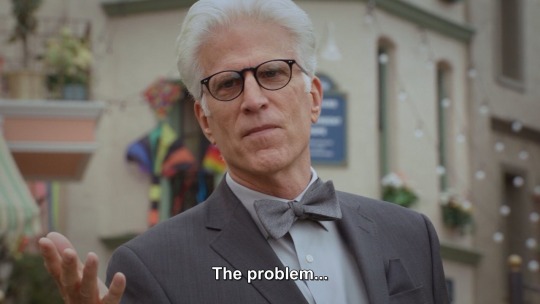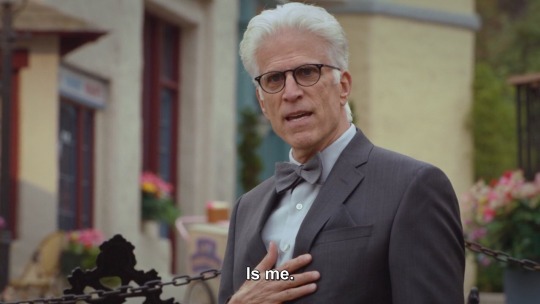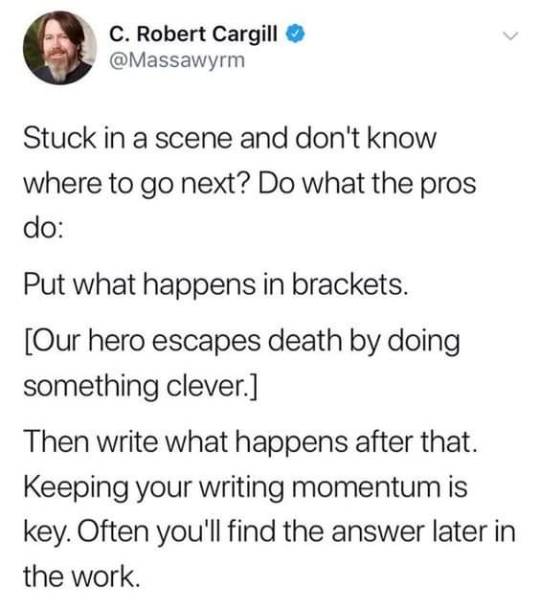| The inbox is closed! We hope to open again soon ♥️ |In a world full of writing advice blogs, you have just stumbled upon another writing advice blog. Oh, except this one actually includes fanfiction! Got questions about summaries/titles? Characterization? How to get reviews? Writing in general? You could maybe ask us. Mobile Tag Page | PayPal
Don't wanna be here? Send us removal request.
Text
Acing pacing in your writing
I’ve read too many books and watched too many shows where pacing has ruined a good story. So, here are some of my tips for getting pacing right:
1. Don’t take too long to get to the inciting incident
Look, showing the ordinary life of your protagonist might be interesting if there’s something strange about their life, but readers want stuff to happen.
At least with genre fiction, you shouldn’t take too long to get to the action - the event that gets the story going.
If you can do it well and have readers invested from the start, you can start with the inciting incident. However, for most works I would recommend having it in the second chapter.
Your readers want to know what the story is about, not what the character thinks of his English teacher
2. Keep it moving, but don’t rush
Action is important. It drives the story and it’s interesting. You should make sure to put enough action in your work. Things should be happening.
BUT a novel is not a play or a movie or a comic. What makes reading a full-length novel so entertaining is the detail. The in-depth characterisation and description. The emotion and thought processes.
So, keep it moving, but don’t sacrifice the juicy details. Don’t skip from one action or dialogue scene to the next without taking your readers deeper into the intricacies of the story and characters.
It’s a delicate balance that can only truly be found by reading a lot and practicing.
3. Avoid a sagging middle
Your beginning is solid. Your end is exciting. But the middle is a chaotic mess that bores the reader. Trust me, it happens more than you might believe.
Sagging middle syndrome is a thing, and the only way to avoid it is to plan.
Look, I like pantsing, but planning the middle of your novel will help your pacing exponentially.
Make a rough outline of what needs to happen to get your characters to the climax. Add a few lighter/character-driven scenes where there are too many action scenes in the sequence. Remove events which are unnecessary. And make sure that everything makes sense!
This counts for second books in series as well. It should be good on its own, not just as a filler.
4. Don’t fast forward to the end
I’m looking at you, Game of Thrones.
If you’ve built up the story and set up everything for the final big bang, you have to deliver.
Keep the pacing somewhat similar to that of the rest of the story. Your readers have gotten used to it. And if they’re still reading at that point, they probably like that pace. Don’t write a relatively slow book and then have the climax be over in three pages.
I know you want the climax to be exciting. So, yes, make it a little more fast-paced than the middle. But not massively different.
5. Trust your characters
As with every aspect of creative writing, character is most important.
Is your character experiencing the scene quickly and choppily? Or are they slowing down and taking in everything?
If you stick with what your characters are feeling, you will get it right.
Look, exams have fried my brain. So, this isn’t the most well-formulated post I’ve made. But I hope that it can be helpful.
Reblog if you found these tips useful. Comment with your own pacing tips. Follow me for similar content.
11K notes
·
View notes
Text
People talk a lot about how reading is necessary for writing, but when you really want to improve your writing, it’s important to go beyond just simple reading. Here are some things to do when reading:
Note how they begin and end the story. There are a ton of rather contradictory pieces of advice about starting stories, so see how they do it in the stories you enjoy. Don’t only look at the most popular stories, but look at your more obscure favorites.
See what strikes you. Is it fast or complicated scenes with a lot of emotions? Is it stark lines? Pithy dialogue? What do you remember the next day?
Pay attention to different styles. It’s not just whether they use past or present tense, first or third person. It’s whether the writing is more neutral or deeper inside character’s heads. Do they use italics? Parentheses? Other interesting stylistic choices? Take the ones you like and try them out in your own writing. See what works and what doesn’t.
Keep track of how they deal with other characters. Do we see a lot of secondary character each for very brief periods of time or are there a couple that show up a lot? How much information do we get about secondary characters? Do they have their own plots or do their plots revolve entirely around the main characters?
Count how many plots there are. Is there just one main plot or are there multiple subplots? Are the storylines mostly plot-based or character-based?
Pay attention to what you don’t like. If you don’t like what’s going on in a book or even just a scene, note what it is. Does the dialogue feel awkward? Are the characters inconsistent? Does the plot feel too convenient or cobbled together? Does the wording just feel off? See if you can spot those issues in your own writing, especially when reading a completed draft or beginning a later draft.
26K notes
·
View notes
Text
If you like your story, then that’s a good enough reason to write it. If you like the plot twist, the character, the trope, then that’s more than enough of a reason to write it. It’s your story, your own little world, and what matters most is that it’s a story you love.
24K notes
·
View notes
Text
for all you writers out there:
donjon has tons of generators. for calendars. for demographics of a country and city. for names (both fantastical and historical) of people, nations, magics, etc.
this site lets you generate/design a city, allowing you to choose size, if you want a river or coast, walls around it, a temple, a main keep, etc.
this twitter, uncharted atlas, tweets generated maps of fantasy regions every hour.
and vulgar allows you to create a language, based on linguistic and grammatical structures!!! go international phonetic alphabet!!!
62K notes
·
View notes
Text
“When you’re trying to create a career as a writer, a little delusional thinking goes a long way.”
— Michael Lewis
633 notes
·
View notes
Text
Commenting fanfiction is the easiest thing in the world once you start doing it.
117K notes
·
View notes
Note
Hi guys, I just want to thank you for all your work :) I am currently developing concepts for my novel and your posts are a tremendous help :D I liked probably all of your posts, and I currently don't have a writing blog, but if I make it, I would reblog absolutely everything :D You go above and beyond to help your fellow writers and I believe it's amazing. You are all wonderful, and although this is not a question, I felt the need to reach you and show my gratitude :D
Thank you so so much for this message!! We certainly try our best 😋👍 Thank you for following and for liking!
- Mod Joanna ♥️
36 notes
·
View notes
Text
Tip Tuesday | Setting Writing Goals

Hello my fellow readers and followers! Another Tip Tuesday coming at you. I was thinking about doing this one a little later in month but maybe people are already thinking about 2020 writing goals. Maybe it’s just me. Just me? Okay then. Well when and if you decide to set some writing goals, here are some tips on what to do.
I am going to go through the process of setting SMART goals for writing in 2020. I will use some of my own personal 2020 writing goals for example.
SMART stands for Specific, Measurable, Achievable, Relevant, Time bound. This is a way to help focus your goals and hopefully achieve them!
1. Specific. You goal needs to be specific and clear. So let’s give an example of a vague goal.
Vague: I want to write more. This is everyone’s goal as far as I can tell, but what is “more”. Is more an entire novel? Is more an additional story a year? We need to define more.
Specific: I want to complete all my outstanding series and requests. That is a goal that is clear and specific. I know exactly what I want to accomplish and I can define it.
2. Measurable. Jumping off from the last point, is your goal measurable? Meaning can you quantify it, do you have a way to determine your progress or completion.
Not Measurable: I want to write more. Yes the goal above is also not measurable. Because what is more? More is not defined. A measurable goal might be “I want to write 250 words a day” or “I want to post one story/chapter a week.” Those are measurable, you can quantify if you have completed it or not.
Measurable: I want to complete all my outstanding series and requests. Again this measurable. I currently have one outstanding series and 25 requests. I can measure my progress.
3. Achievable. Is your goal attainable? Is it realistic? Don’t set goals you can’t reasonably meet. If you can only write one day a week because of your job and other obligations not set a goal that you will write 5 days a week. You are setting yourself up for disappointment.
Not Achievable: I want to write a full length twelve book bestseller series by the end of January. I don’t care how fast you type, you can’t do that.
Achievable: I want to finish my current series by the end of January. I have about four to five chapters left to write and I have fixed my plot problem (in my mind). I can realistically write four to five chapters in a month.
4. Relevant. Is it a worthwhile goal? Is it the right time for this goal? So if you are moving across cross country, starting a new multichapter series may not be a relevant goal. Follower goals may not be not relevant. Note/Like/Kudos goals may not be relevant. Figure out what is really important to you.
5. Time Bound. Is there a deadline or due date for your goal? It is important to set deadline so you can remain focus on your goal.
Not Time Bound: I want to finish my outstanding requests. When are you going to finish it? Next month? Six months? The whole year?
Time Bound: I will finish my outstanding series by the end of January. When do I plan on getting it done? End of January. Time bound. Boom.
Quick Tips:
I personally like to set yearlong or long term goals. Some of mine are writing a Professor Hiddleston AU series or one shot, writing a Jonathan Pine story and a James Conrad story, and writing the two sequels to Should…
I also set quarterly goals and monthly goals. One of my quarterly goals is to get through my 25 requests. I am pretty sure I can do that in four months. Unless something goes completely haywire. My big January monthly goals is to finish True Love’s Course.
Set weekly goals. I love breaking my goals down into bite sized pieces. So every week I set out writing goals. Currently it is to write and edit chapters of my Christmas story. Sometimes it is to outline a story or write a one shot.
Write your goals down. Put them somewhere you can see them. Check them off, Cross them out! Get at them!
Until next Tuesday!
332 notes
·
View notes
Text

36K notes
·
View notes
Note
hey do you have any tips on plot development? how to do come up with relevant but dramatic things to keep the plot going? i also don’t want to make it too intense?
I actually have quite a lot of resources that I’ve created over the years surrounding plot development. I’ve linked as many as I could find for you:
Resources For Plot Development
Useful Writing Resources
Useful Writing Resources II
31 Days of Plot Development
Novel Planning 101
How To Write A Good Plot Twist
How To Foreshadow
What To Cut Out Of Your Story
Tackling Subplots
Things A Reader Needs From A Story
A Guide To Tension & Suspense In Your Writing
How To Turn A Good Idea Into A Good Story
Planning A Scene In A Story
21 Plot Shapes and the Pros and Cons Of Each
How To Outline Effectively
Tips On Writing Intense Scenes
Writing The First Chapter
Tips On Starting A Scene
Plot Structures
Finding & Fixing Plot Holes
17K notes
·
View notes
Text
Donation Page Open!
Hi hi! Okay, so no expectations here, but if this blog has ever helped you with your writing conundrums and you’d like to make a donation, you can now click here and be able to do that. Absolutely no pressure, but if you’re feeling generous… 😋♥️

- Mod Joanna ♥️
29 notes
·
View notes
Text
Donation Page Open!
Hi hi! Okay, so no expectations here, but if this blog has ever helped you with your writing conundrums and you’d like to make a donation, you can now click here and be able to do that. Absolutely no pressure, but if you’re feeling generous... 😋♥️

- Mod Joanna ♥️
#a girl wants to visit her girlfriend but is broke broke broke#help a lesbian out#my post#donations#writing blog#writing tips#writing advice
29 notes
·
View notes
Photo

The Job
A Spy’s Motivation
Economic Espionage (2)
Espionage (2)
Espionage Rant
How do spies operate?
How Spies Work
Modern Espionage
On Spies
Recruiting Spies
Spies
True Psychology of the Insider Spy
What is espionage?
Tradecraft
Basic Spy Tradecraft
Codewords (2)
Top 10 Spy Tactics
12 Corporate Espionage Tactics
15 Spy Concealments
37 Industrial Espionage Techniques
5 Techniques of the Soviet Union
6 New Spy Technologies
Other
The Encyclopedia of Espionage, Intelligence, and Security
Ethics, Espionage, and Covert Action
International Spy Museum
Opinions and Essays on Modern Espionage
Real Spies (documentary)
Secrets of the CIA (documentary)
World War II Manual
4K notes
·
View notes
Text
write for the audience you want, not the one you’re afraid of
81K notes
·
View notes
Text
When you keep getting easily distracted while writing:


76K notes
·
View notes
Text
Another thing I love in fiction is when dialogue immediately echoes the same phrasing used in the narration. It can be startling and funny.
Ex.:
As they made their way back to the car, Farad felt the prickle of eyes upon him. He looked around and spotted the culprits—perched on the roof of a van, a gaggle of dour-faced teenagers was watching them judgmentally.
“Don’t look now,” he whispered to his companion, “But a gaggle of dour-faced teenagers is watching us judgementally.”
50K notes
·
View notes
